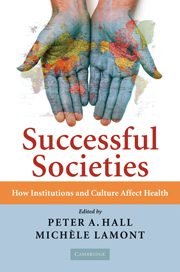Book contents
- Frontmatter
- Contents
- Contributors
- Preface
- Introduction
- 1 Population Health and the Dynamics of Collective Development
- 2 Social Interactions in Human Development: Pathways to Health and Capabilities
- 3 Health, Social Relations, and Public Policy
- 4 Population Health and Development: An Institutional-Cultural Approach to Capability Expansion
- 5 Responding to AIDS in Sub-Saharan Africa: Culture, Institutions, and Health
- 6 Responses to Racism, Health, and Social Inclusion as a Dimension of Successful Societies
- 7 Collective Imaginaries and Population Health: How Health Data Can Highlight Cultural History
- 8 Making Sense of Contagion: Citizenship Regimes and Public Health in Victorian England
- 9 The Multicultural Welfare State?
- 10 From State-Centrism to Neoliberalism: Macro-Historical Contexts of Population Health since World War II
- Bibliography
- Index
7 - Collective Imaginaries and Population Health: How Health Data Can Highlight Cultural History
Published online by Cambridge University Press: 05 June 2012
- Frontmatter
- Contents
- Contributors
- Preface
- Introduction
- 1 Population Health and the Dynamics of Collective Development
- 2 Social Interactions in Human Development: Pathways to Health and Capabilities
- 3 Health, Social Relations, and Public Policy
- 4 Population Health and Development: An Institutional-Cultural Approach to Capability Expansion
- 5 Responding to AIDS in Sub-Saharan Africa: Culture, Institutions, and Health
- 6 Responses to Racism, Health, and Social Inclusion as a Dimension of Successful Societies
- 7 Collective Imaginaries and Population Health: How Health Data Can Highlight Cultural History
- 8 Making Sense of Contagion: Citizenship Regimes and Public Health in Victorian England
- 9 The Multicultural Welfare State?
- 10 From State-Centrism to Neoliberalism: Macro-Historical Contexts of Population Health since World War II
- Bibliography
- Index
Summary
This chapter on health, society, and culture in Québec has its own story, which is worth telling as a way of a summary. At the outset, my goal was to elicit how culture (particularly collective imaginary broadly construed as a package of values, beliefs, and ideals wrapped up in myths – see discussion later) can at least indirectly impact population health. Accordingly, I engaged in an attempt to recreate the cultural trend of Québec society between 1850 and 1960 with a view to comparing it with the health pattern (as mirrored in mortality rates). Soon, this endeavour came across two major obstacles. First, historians strongly disagree on the interpretation of Québec's cultural past. I had to choose between two diametrically opposed theses or paradigms (I will call them “Survival” and “Modernist”), a choice I was unwilling to make on the basis of the available evidence. Second, as we shall see, both theses fail to fully account for the shape of the health trend during the period.
In the face of the first puzzle, I finally decided to reverse my approach and to use the sociocultural/health framework backward: rather than traveling the interaction chain from culture to health, as was initially intended, I simply used the health record as a landmark from which I could make inferences about the sociocultural trend.
- Type
- Chapter
- Information
- Successful SocietiesHow Institutions and Culture Affect Health, pp. 169 - 200Publisher: Cambridge University PressPrint publication year: 2009
- 9
- Cited by



